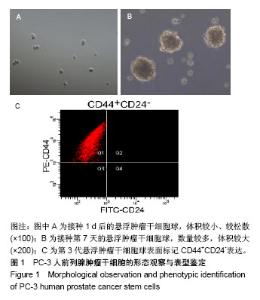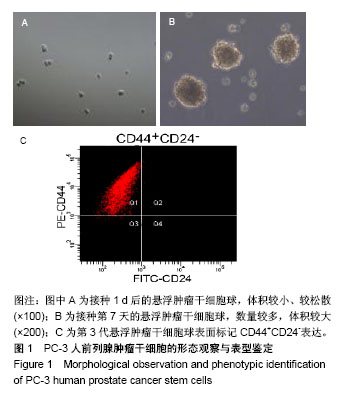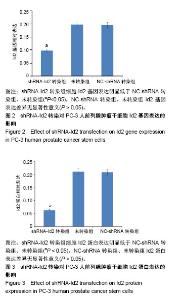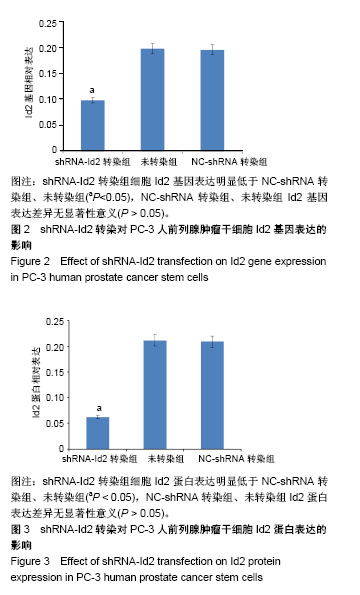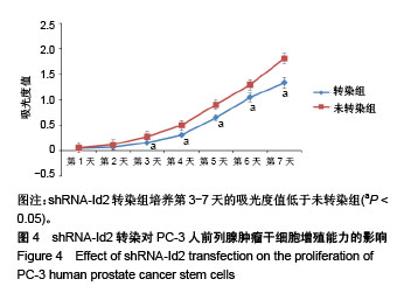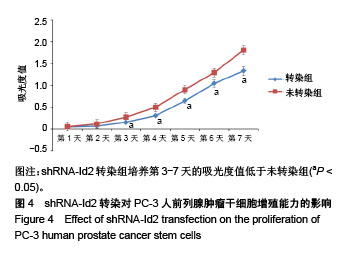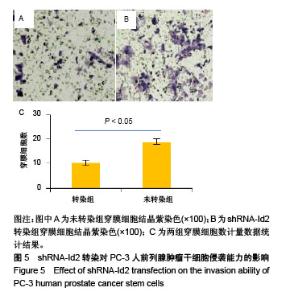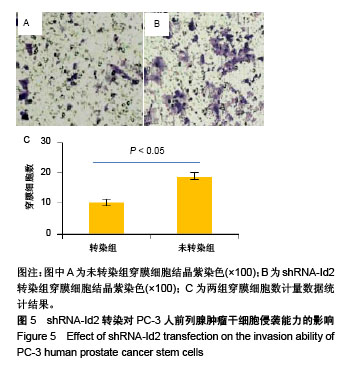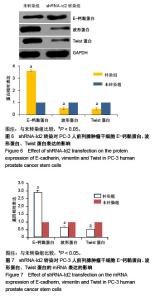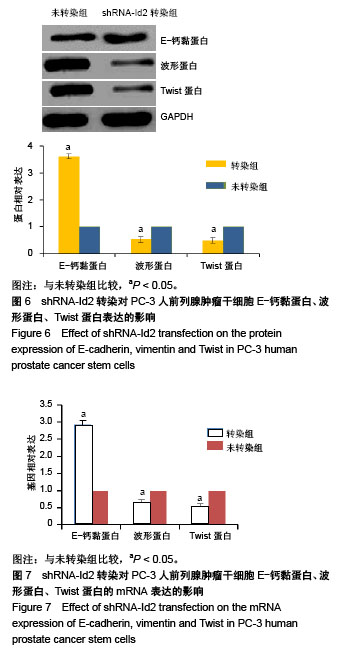| [1] 韩苏军,张思维,陈万青,等.中国前列腺癌发病现状和流行趋势分析[J]. 临床肿瘤学杂志, 2013,18(4):330-334.[2] Rycaj K, Tang DG. Molecular determinants of prostate cancer metastasis. Oncotarget. 2017;8(50):88211-88231.[3] Perk J, Iavarone A, Benezra R. Id family of helix-loop-helix proteins in cancer. Nat Rev Cancer. 2005;5(8):603-614.[4] Patel D, Morton DJ, Carey J, et al. Inhibitor of differentiation 4 (ID4): From development to cancer. Biochim Biophys Acta. 2015;1855(1):92-103.[5] Ling F, Kang B, Sun XH. Id proteins: small molecules, mighty regulators. Curr Top Dev Biol. 2014;110:189-216.[6] 李亚卓,赵坡.Id2与NF-κB/P65在胃癌中的表达及临床病理意义[J].中华医学杂志,2018,98(11):846-850[7] Gray MJ, Dallas NA, Van Buren G, et al. Therapeutic targeting of Id2 reduces growth of human colorectal carcinoma in the murine liver. Oncogene. 2008;27(57):7192-7200.[8] Lasorella A, Rothschild G, Yokota Y, et al. Id2 mediates tumor initiation, proliferation, and angiogenesis in Rb mutant mice. Mol Cell Biol. 2005;25(9):3563-3574.[9] Coma S, Amin DN, Shimizu A, et al. Id2 promotes tumor cell migration and invasion through transcriptional repression of semaphorin 3F. Cancer Res. 2010;70(9):3823-3832.[10] 汪萍,李晓军,贾丽,等.分化抑制因子Id2和Id3在肿瘤细胞中的表达[J].医学研究生报,2007,20(1):20-23.[11] 汪洋,冯杨焜,吴岩,等.人前列腺癌PC-3细胞系中肿瘤干细胞的富集、鉴定以及生物学特征的初步研究[J].中国男科学杂志, 2018, 32(2):20-29.[12] 岳黎敏,张莽,程书珍,等. Id2和VEGF的表达与食管鳞癌临床病理特征的关系研究[J].现代中西医结合杂志 2015,24(33): 3662-3664,3684.[13] 温晓芬,许宏武,Min Chen,等.分化抑制因子2的生物学功能及其在乳腺癌中的研究进展[J].中华乳腺病杂志(电子版), 2016,10(6): 366-369.[14] 邱建龙,杨维群,徐海刚. Id2在上皮性卵巢肿瘤中的表达及意义[J].临床肿瘤学杂志, 2011,16(12): 1088-1091.[15] 杨忠信,李晓宇,蔡静,等.Xklp2靶蛋白对肺癌细胞裸鼠成瘤能力的影响及机制研究[J].实用医院临床杂志,2018,15(2):4-8.[16] 赵泓帝,张振,邵志强,等. 沉默EMMPRIN对肾透明细胞癌增殖的影响[J].现代肿瘤医学,2018,26(7): 992-997.[17] 鲁保才,卢振民,张爱民,等.干扰性小核糖核酸靶向抑制趋化因子受体4基因表达对鼻咽癌细胞增殖和侵袭的影响[J].新乡医学院学报,2018,35(1):30-34.[18] 赵振宇,贺华,卢亦成,等.Id2shRNA慢病毒载体的构建及其转染后对胶质瘤细胞增殖和凋亡的影响[J].第二军医大学学报, 2011, 32(6):598-602.[19] 姚春飞.恶性肿瘤侵袭与转移的病理探讨[J].养生保健指南, 2018, (7):246,276.[20] 薛无涯,王舰梅,夏天,等.miR-204-5p对结直肠癌细胞增殖、侵袭、迁移及上皮间质转化的影响[J].西南医科大学学报, 2018,41(2): 104-110.[21] 杜媛鲲,米源,陈阁,等.Gli通过PI3K/AKT途径促进肺腺癌A549细胞侵袭转移的研究[J].河北医科大学学报,2018,39(1):24-28.[22] 李艳,陈琼霞,王绪明. 敲低Stat5对甲状腺癌TT细胞侵袭及上皮间质转化的影响[J].国际肿瘤学杂志, 2018,45(1):1-4.[23] Lo UG, Lee CF, Lee MS, et al. The Role and Mechanism of Epithelial-to-Mesenchymal Transition in Prostate Cancer Progression. Int J Mol Sci. 2017;18(10): E2079.[24] 刘婷,吴俊成,陆伦根,等.STAT3加重TGF-β1诱导的肝癌细胞上皮-间质转化的发生[J].肝脏,2018,23(2):128-132.[25] Ivanova K, Ananiev J, Aleksandrova E, et al. Expression of E-Cadherin/Beta-Catenin in Epithelial Carcinomas of the Thyroid Gland. Open Access Maced J Med Sci. 2017;5(2): 155-159.[26] Da C, Wu K, Yue C, et al. N-cadherin promotes thyroid tumorigenesis through modulating major signaling pathways. Oncotarget. 2017;8(5):8131-8142.[27] Calangiu CM, Simionescu CE, Stepan AE, et al. The expression of CK19, vimentin and E-cadherin in differentiated thyroid carcinomas. Rom J Morphol Embryol. 2014;55(3): 919-925.[28] 付海丹.宫颈上皮内瘤变组织中转录因子Twist、Snail的表达及与上皮间质转化、细胞增殖的关系[J].海南医学院学报, 2016,22(13): 1339-1342.[29] 高原,郑小玉. Twist和Snail在子宫腺肌病患者异位内膜组织中的表达及意义[J].临床医学研究与实践,2018,3(14):1-3,10.[30] Kwok WK, Ling MT, Lee TW, et al. Up-regulation of TWIST in prostate cancer and its implication as a therapeutic target. Cancer Res. 2005;65(12):5153-5162. |
